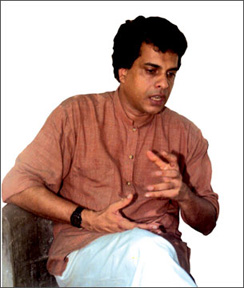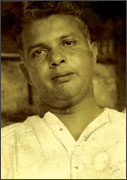Recognising
talents a challenge before the nation - Kolitha Bhanu Dissanayake
Speaking on the systemic injustice caused to highly talented students
who would otherwise enter the University of Visual and Performing Arts,
Kolitha Bhanu Dissanayake, the Dean of the University of Visual and
Performing Arts said injustice is caused to some talented students who
have secured A pass for Music at the Advanced Level Examination and B or
C passes for other subjects as they secured less marks on the Z Score
than those students who gained B or C grade for Music and A or B passes
for other subjects.
Victims
The first victims of the selection test will be those talented
students who secured less Z score although they obtained A pass for
Music. As the students are selected on the basis of Z Score, these
students will not be qualified to enter the university.
This has deprived university of students with inborn talents who
could make a lasting contribution to the arena of Music.
|

Kolith Bhanu, the Dean of the Faculty of Music University of
Visual and Performing Art. A classical voice with a divergence
that touches the soul. |
|

Dr. Lionel Edirisinghe, the founder of the University of Visual
and Performing Art. Though you are not among us, your lasting
contribution enlightening two nations will ever be remembered.
|
He is of the view that at least, five of such talented students
should be given a chance of entering the University irrespective of
their Z score marks as those students earned A pass for Music.
The Royal Academy of Arts in London has made provisions for absorbing
talents into the Institute. Students who have a proven track record and
earned laurels at national level music competitions should also given a
chance so that University would produce talented musicians.
Currently, the Faculty of Music suffers from lack of physical, human
and other resources although the six Departments including Department of
North Indian Music, Department of Western Music, Department of
Ethno-musicology, Department of Comparative Music and Department of
Applied Music function in the University three years after it being
upgraded to the University status.
University authorities can not be blamed for the situation. Though
His Excellency President Mahinda Rajapaksa granted an audience to
discuss the issues, the outcomes of the discussion have not been
translated into reality speedily yet hampering the growth of the
University.
Kolitha Bhanu is of the view that issues should be addressed
immediately as they adversely affect the growth and administration of
the university. For instance, Heads of Departments have no offices and
not even a telephone.
The University suffers from acute shortage of instruments of music
and basic facilities for conducting practical sessions. If the
university is to live up to its lofty ideals and vision of the
university, these issues should be addressed immediately.
Duty of the establishment
Kolitha Bhanu emphasised the fact that same importance accorded to
Faculties of Medicine, Science, Agriculture, Law etc. should also be
accorded to Faculty of Music and the University of Visual and Performing
Arts as it contributes to create social harmony and refined public
taste. It is the doctors and the artistes who make a healthy society and
individuals fit for a civilization.
Referring to practical tests that have been conducted as a part of
Ordinary Level and Advanced Level Examinations, Kolitha stressed the
fact that subjects of Visual Arts and Music can not be taught without
practical sessions and not adding the marks at practical sessions to the
aggregate will, in the long run, hamper the progress of the field.
‘Sophisticated ignorance’
Responding to the grossly misleading and ill-informed statements that
Dr. Tissa Abeysekara made at recently held first convocation of the
University of Visual and Performing Arts, Kolitha Bhanu Dissanayake
stated Dr. Tissa Abeysekara has no qualifications or right to adversely
criticise the founders of the University including Dr. Lionel
Edirisinghe that their works have lead to the crisis in field of music
in Sri Lanka at a time University functions under numerous constrains.
Kolitha is of the view that University administration should exercise
prudent in inviting persons to address main functions of the University.
He further stated that the University of Visual and Performing Arts has
a long history.
The Government’s College of Music and then the Institute of Aesthetic
Studies and became the University of Visual and Performing Arts. Though
there may be shortcomings in the long journey through the history the
University is proud of its lasting contribution made to the field of
music and Visual and Performing Arts.
It is irony of history that founders of the University like Dr.
Lionel Edirisinghe, colossal in the field, has been severely criticised
by Dr. Tissa Abeysekara. Kolitha emphatically stated that Dr. Tissa
Abeysekara has no moral right to point a finger at Dr. Lionel
Edirisinghe who dedicated for the creation of generation of musicians.
To identify this generation as “brand of Pothe Guras” is a grave
mistake. Dr. Tissa Abeysekara has, apparently, come to this conclusion
based on a narrow mind set.
Unfounded logic
Kolitha Bhanu emphasised the fact that Western Music is the tradition
of music where the player has to follow written notations if he or she
has to present a classical performance. However, in the North Indian
tradition, player has a greater freedom in expressing it after learnt
the classical ragas. This does not mean that even Western Music is
confined to its notations.
Speaking on the diverse traditions of music, Kolitha Bhanu stated
that traditions of North Indian music, Karnataka music and Western Music
are three distinct traditions with their own distinct characteristics.
The theory of music is embedded in these identical characteristics
and in order to study the theory, one should study the tradition. If one
wants to learn Western music, one should learn Western tradition, social
background. It is advisable that it is best for the persons who have no
practical knowledge of the subject such as Music should be refrain from
commenting on it.
Kolitha Bhanu questions the statement by Dr. Tissa Abeysekara that
“It is yet to appreciate what Khemadasa has done” and “Khemadasa is the
musician who greatly influenced the course of contemporary Music’. What
Dr. Tissa Abeysekara has got to say about musicians like R.A Chandrasena
and his melodious notes, Shelton Premaratne and Dr. Lionel Algama.
If so haven’t the next generation of musicians like Victor Ratnayake,
Rohana Weerasinghe and Prof. Sanath Nandasiri made no contribution to
music?. Has Dr. Ameradeva contributed nothing to Sri Lankan music?
The attempt to hoodwink the reality in order to justify his personal
opinion is childish.
Misleading the public
Kolitha Bhanu further states that he could not understand on what
basis that Dr. Tissa Abeysekara uses the word “Pothe Guru” as written
notes are primarily used in Western tradition of Music. Dr. Tissa
Abeysekara states that Pradeep Ratnayake, Harsha Makalanda and Ravibandu
Vidyapathy are those musicians who grew up outside the University and
experimenting with music.
Admitting that there are highly talented artistes and personal
friends of him, Kolitha Bahnu pointed out that they have also learnt the
tradition well and practice it well. Dr. Tissa Abeysekara states that
“Music education in this county has to be reviewed all over again.
Teaching music can not be done by confining students to a particular
tradition” and “though there are differences in diverse traditions, all
fundamentals beyond them are the common to all traditions”.
If Dr. Tissa Abeysekara maintains that all fundamentals are common to
all traditions, Kolitha Bhanu invites Dr. Tissa Abeysekara to come for
an open discussion. In an experimental work, one can amalgamate
compatible fundamentals in those traditions.
There are compatible fundamentals that are common to three main
traditions of music as well as those which are not compatible. Pradeep
Ratnayake, Ravibandu Vidyapathy and Harsha Makalanda can fuse
fundamentals of different traditions as they have learnt the tradition
and fundamentals well.
If they have learnt only the fundamentals they could not experiment
with music and also engage in fusion music. Kolitha Bhanu states that
statement that all fundamentals are common to all traditions of music is
erroneous.
This shows that Dr. Tissa Abeysekara has no practical knowledge of
music. Kolitha Bhanu states that it was not clear whether that Dr. Tissa
Abeysekara who made a statement comparing Bhathiya and Santush who move
their lips to recorded music to Colonial Cousins and as ‘immensely
gifted musicians’ stoop to that low level after he was conferred with
the honourary doctorate.
Kolitha Bhanu requests that Dr. Tissa Abeysekara should not stoop to
that level but should be a person who should appreciate art music and
that he should not misuse the phrases such as “immensely gifted musician
“(Kruthahastha, as appeared in his Sinhala speech) and if he (Dr. Tissa
Abeysekara) uses word Kruthahastha for Bhathiya and Santush, he should
find an appropriate term in Sinhala that should be used for Dr. W.D.
Ameradeva. Senior Lecturers Dr. Nirmala Kumari Rodrigo, Dr. Thushara
Ratnayake, Kumara Liyanawatte and Rashmi Sangeetha join hands with
Kolitha Bhanu Dissanayake in denouncing the speech by Dr. Tissa
Abeysekara.
Cultured voice
Kolitha Bhanu has launched his only CD titled “Inspiration” in 1994
after a lapse of twenty years.
He has used three traditions of music for the CD, fusing the
compatible fundamentals and score of music which are not compatible have
been taken in their original forms. Diverse traditions of music such as
Western, North Indian and Karnataka as well as other traditions of music
have been used. Kolitha Bhanu was inspired by the Album by Pandit Ravi
Shankar when he was an Advanced Level Student and the CD “Inspiration”
is the fruition of that dream.
He was an old boy of Mahanama College and was taught music by Miss
Swarnalatha Peris.
After completion of his degree here in Sri Lanka, he left for Banaras
Hindu University in India where he earned his Masters of Music.
Kolitha Bhanu Dissanayake is the dean of the Faculty of Music in the
University of Visual and Performing Arts.What strikes one’s mind when
listening to his music is that how melodious and cultured Kolitha’s
voice is and the way in which the voice integrates into the inner soul
of the music score.
This unique work bears testimony to his abundance of talents that
make him a recognised vocalist. He could simply breathe his last as a
reputed vocalist rather than becoming a popular singer.
His second creation to the nation “Sala Nisala” with other artistes
was also launched yesterday at BMICH. |
